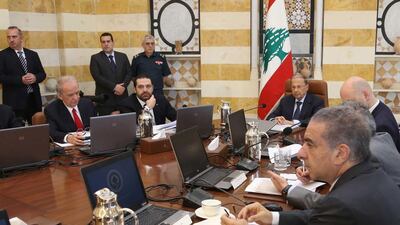BEIRUT // Lebanon moved a step closer on Wednesday to holding its first parliamentary elections since 2009, with the country’s cabinet finally overcoming years of deadlock and indecision over a new voting law.
The approved draft law, which changes Lebanon’s voting system from one based on parliamentary seats reserved for religious sects to proportional representation, will now be referred to parliament, which will vote on it on Friday. Politicians have indicated that the law will pass.
But while the law is being hailed as a success, it also comes with a cabinet agreement to extend parliament’s term for another 11 months from June 20, to arrange the elections.
The extension would be parliament’s third since 2013 when its members’ terms first expired. Previous extensions were justified by parliament members as necessary due to instability caused by the Syrian civil war and later, the country’s lack of a president.
Elections were scheduled to occur last month, but with the country's lawmakers unable to agree on a voting law, Lebanon instead drifted towards a political vacuum with no mechanism by which to hold elections.
If elections go ahead next May as planned, members of parliament will have served nine years — five years longer than the four-year terms they were elected to in 2009.
Activists and even some parliamentarians have called the extensions illegal and have warned that Lebanon’s lack of elections meant that the country was becoming increasingly undemocratic.
You Stink, a prominent activist group that was behind a protest movement that crippled downtown Beirut in 2015, called for protests on Wednesday as news of the parliamentary extension came in.
Supporters of the draft law say an extension is the only way Lebanon can hold elections under a voting system that is very different than the one under which the country’s last elections were held.
“The extension which we will resort to is only technical and necessary for setting the mechanisms that guarantee a modern and transparent election,” said prime minister Saad Hariri, who leads the Sunni-backed Future Movement, according to the state-run National News Agency.
Previous parliamentary elections in Lebanon saw different sects granted a certain number of parliamentary seats in each district based on a quota, with candidates being elected by all voters in a district, regardless of sect.
But with no census in Lebanon since 1932, these quotas have been attacked as unfair and not representative of districts today. The system has also been criticised for allowing dominant sects in one district to determine the winner of a seat reserved for a different sect.
Proportional representation may at first glance seem to be a progressive step in a country where all the major political parties are based on sectarian identities and where sectarian quotas defined past elections.
However, the parties that first floated proportional representation appear to have been banking on winning a bigger share of power for their co-religionists and supporters than they could under the old electoral system.
In announcing the breakthrough, Lebanese president Michel Aoun acknowledged that the new law may not be fair to everybody.
“We may not be able to achieve totally fair representation, but this formula is certainly a step forward,” he said.
jwood@thenational.ae

